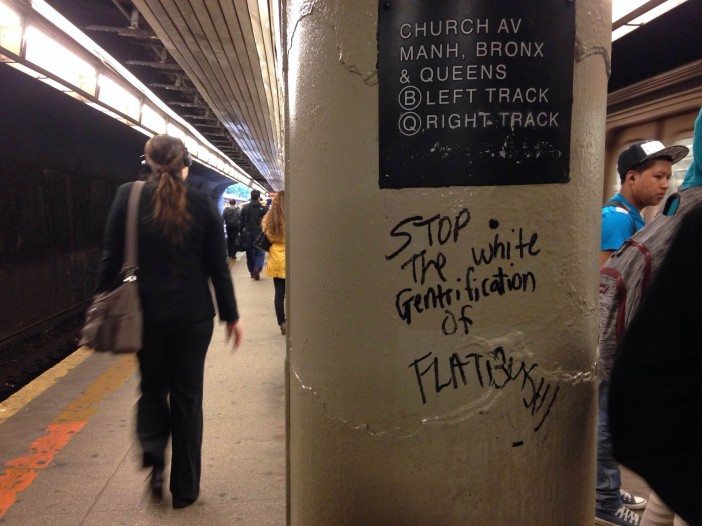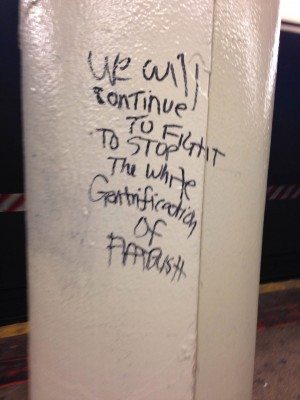More Perspectives On Anti-Gentrification Graffiti At Church Avenue


A few weeks ago, neighbor Cori Carl contributed a Ditmas Park Perspective piece on anti-gentrification sentiments written at the Church Avenue B/Q stop. Many others joined the conversation to talk about race, class, and even age, and how best to keep the Ditmas Park area affordable and welcoming for all–or, alternatively, how no one should feel entitled to a home in a particular place. Gentrification is a loaded concept–on our comment thread alone, neighbors seemed to have several different definitions of it, and accordingly felt positively or negatively (or were wrestling with conflicting feelings) about it. Especially considering recent concern over potential targeted sabotage of rental housing in up-and-coming areas, major chains like Domino’s moving into former mom-and-pop spaces, and whether the Kings Theatre’s planned security measures are racially motivated, the discussion seems nowhere near finished–so when neighbors contribute their thoughts on gentrification (or public accounts of others’ thoughts on it), it seems important to document those thoughts, and to learn about the repercussions of the conversation. Neighbor Nick Kozak recently sent in photos of more Church Avenue station messages…



… including some responses from other neighbors.

The small stickers read, “If you really wanna rise up, you wouldn’t fight racism with racism. I actually grew up a few blocks away, but thanks for judging. I may look white, but you don’t know shit about me or my family. Even if you did, it shouldn’t matter because a rich and strong culture is hindered by ethnocentrism. Don’t make me feel unwelcome. What good will it do you?”

Neighbor Caroline Piela also sent in a recent xoJane article by writer Phoebe Robinson, whose local subway station is Church Avenue. Says Phoebe in her piece, Keep Your Gentrification Assumptions To Yourself, Neighbors — It’s All Good In Our Interracial Relationship Household:
[I]t’s not just graffiti. I’ve noticed the amount of stares that my boyfriend and I have been getting has increased exponentially. We’ve been dating for almost three years and most strangers seemed to be OK with it, but during this past year, there’s been an influx of white people moving into the building… and the indifferent glances now have fire behind them…
… [G]entrification, especially in Brooklyn, is a serious issue. It displaces plenty of business owners and apartment renters. It sends a message that people of color don’t deserve quality like a decent grocery store or a good convenience store until developers and CEOs decide to lure white folks with disposable income to another area. The wealthy can get richer while people like me get priced out.
That’s right — after living in my neighborhood for the past six years, I will have to move when my lease is up because I can’t afford to stay here by myself. So, hey, people on the street giving my boo and me dirty look? I. Get. It. I’m affected by gentrification just as much as you are. I’m just as powerless as you are…
Clearly, the effects of gentrification are messy, ugly, and complicated, but these garbage graffiti signs and ugly stares we have to endure is utter nonsense. And I’m pretty sure that if I went to my boyfriend’s neighborhood and saw various graffiti about how black people bring down the value of the area and that it is a white neighborhood, the main people writing these signs would be running to my defense. So knock it off. Avert your eyes when we cross your path if you can’t handle it. Curse us out in your head if you want to. But keep in mind that he’s probably not so different from you: broke and living in Brooklyn.
Have the recently-posted signs at Church Avenue, or experiences like the stares directed at Phoebe and her boyfriend, actually done more good than harm? Have you begun communicating more honestly with your neighbors about the changes in our neighborhood, have you made a conscious effort to become part of your building or block’s community, or have you taken some other action that you might not have taken before seeing the graffiti or reading about it?
All photos by Nick Kozak




